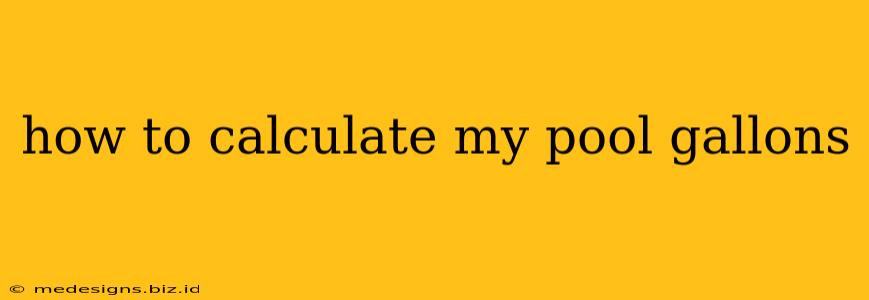Knowing the gallons in your pool is crucial for various reasons. Whether you're adding chemicals, figuring out energy costs, or simply satisfying your curiosity, accurately calculating your pool's volume is essential. This guide will walk you through several methods for determining your pool's gallonage. We'll cover the easiest methods for common pool shapes, along with a more involved calculation for irregular shapes.
Understanding the Importance of Accurate Pool Volume Calculation
Knowing your pool's volume is important for several key aspects of pool ownership:
- Chemical Balancing: Accurate chemical dosages depend directly on your pool's volume. Incorrect calculations can lead to imbalances that affect water clarity, safety, and equipment lifespan.
- Energy Costs: Heating and maintaining your pool's temperature consumes energy. Knowing the volume helps you estimate energy usage and costs.
- Water Changes: Periodically draining and refilling your pool is necessary for maintaining water quality. Knowing the volume helps you plan accordingly.
- Troubleshooting: Problems with your pool equipment or water quality often require understanding the volume of water involved.
Easy Methods for Common Pool Shapes
For standard pool shapes like rectangular, round, and oval, calculating the volume is relatively straightforward. Here's how:
Rectangular Pools
The simplest calculation involves the following formula:
Length (ft) x Width (ft) x Average Depth (ft) x 7.5 = Gallons
- Length: Measure the length of your pool in feet.
- Width: Measure the width of your pool in feet.
- Average Depth: For rectangular pools with a consistent depth, simply measure the depth. For pools with varying depths, measure the depth at both ends and in the middle, then average the three measurements.
- 7.5: This is the approximate number of gallons in one cubic foot of water.
Example: A rectangular pool 15 feet long, 10 feet wide, and 4 feet deep would contain: 15 x 10 x 4 x 7.5 = 4500 gallons
Round Pools
Calculating the volume of a round pool requires a slightly different formula:
π x (Radius (ft))^2 x Average Depth (ft) x 7.5 = Gallons
- π (pi): Use 3.14 as an approximation for pi.
- Radius: The radius is half of the diameter. Measure the diameter (the distance across the pool) and divide by 2.
- Average Depth: As with rectangular pools, measure the depth at several points and average the results.
- 7.5: Again, this is the approximate gallons per cubic foot.
Example: A round pool with a diameter of 20 feet and an average depth of 5 feet would contain: 3.14 x (10)^2 x 5 x 7.5 = 11775 gallons
Oval Pools
Oval pools are essentially two half-circles connected by a rectangle. Calculate the volume in two parts:
- Rectangle: Use the rectangular pool formula above.
- Circles: Calculate the volume of one circle (using the round pool formula) and multiply by 2.
- Total: Add the volume of the rectangle and the two half-circles together.
Calculating Gallons for Irregularly Shaped Pools
For irregularly shaped pools, the process becomes slightly more complex. A reliable way to determine the volume is through the following:
The Multiple-Measurement Method:
- Divide into Sections: Visually divide your pool into smaller, more regular sections (rectangles, squares, or triangles).
- Measure each Section: Measure the dimensions (length, width, depth) of each section.
- Calculate Individual Volumes: Calculate the volume of each section separately using the appropriate formula for its shape (as described above).
- Total Volume: Sum the volumes of all sections to obtain the approximate total volume of your pool.
This method requires more measurements and calculations, but it yields a more accurate result for irregularly shaped pools.
Note: Always double-check your measurements and calculations to ensure accuracy. A slight error in measurement can significantly affect the final gallonage calculation.
Conclusion
Accurately calculating your pool's gallonage is essential for proper maintenance and chemical management. By using these simple methods, you can easily determine the volume of your pool and keep it in optimal condition. Remember to always prioritize safety when performing these measurements and never enter a pool alone.
